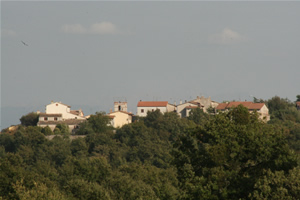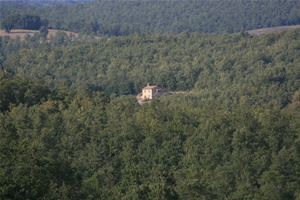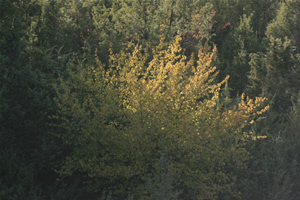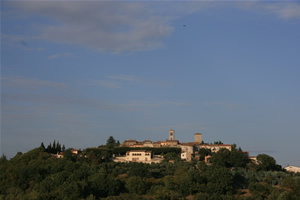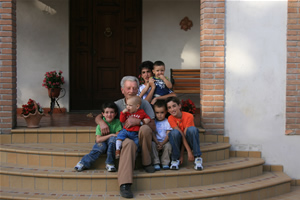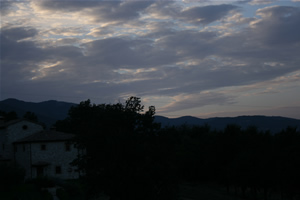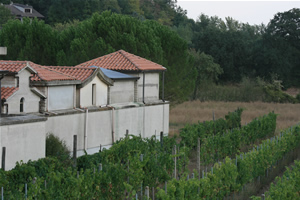| |
LA
MIA UMBRIA
La
“mia Umbria” siede fuori la porta di un vecchio
casale a guardare con signorile indifferenza il tempo che le corre
davanti, concedendosi solo a chi la sa ascoltare rispettoso dei
suoi lunghi silenzi.
Dove Lei vive, a differenza di altri arcinoti posti della Regione
non ci sono vini pregiati, celebri santi, chiese imponenti, variopinte
marce, ne tantomeno sagre, palii o quintane fatte ad uso e consumo
di chi esce domenicalmente dalla città. A volte se li vede
passare davanti “quelli della città”
che corrono a ritrovarsi in quei ristoranti tutti troppo uguali,
dove le sale sono imponenti come le navate di una cattedrale e in
cui l’inevitabile squillare dei cellulari fa compagnia all’indifferente
strepitio dei bambini che si rincorrono tra i tavoli inseguendo
il nulla. Dopo aver mangiato più del dovuto rimane solo il
tempo per una svogliata passeggiata e poi alle prime luci dei fari
si torna impazienti verso la calcistica orgia televisiva, con i
portabagagli zeppi dei sapori di una volta che non si sono saputi
nè apprezzare nè capire perché per farlo ci
vuole il tempo e il silenzio accompagnati da una bella storia.
La “mia Umbria” vive nascosta in un posto dove
tutti la possono trovare ma solo in pochi la possiamo vedere, gelosa
della Sua apparente monotonia e dei suoi rituali che profumano di
un qualcosa che viene da lontano,indifferente alla fretta raccontando
poco ma ricordando molto.
E’ orgogliosa e pretende di essere capita prima di concedere
la Sua amicizia che se l’avrete lo sarà per sempre,
senza nulla chiedere ma generosamente dando in cambio molto.
I più però si stancano di quella riservatezza e scambiandola
per superbia, preferiscono allontanarsi scomparendo da un giorno
all’altro come da un giorno all’altro erano entusiasticamente
arrivati, nella cittadina presunzione di capire tutto ed avere subito.
Per arrivarci è semplice: si prende l’autostrada e
la si abbandona ad Orte si prosegue ancora tortuosamente avanti
con le strade che si restringono sino ad arrivare là dove
le case in pietra hanno le mura spesse e le finestre strette, mentre
l’orizzonte non è tagliato dagli ineducati fili dell’alta
tensione. E’ facile non si può sbagliare!
La Sua stagione è l’autunno con la terra scura dei
campi mossa di fresco e i boschi che ogni giorno vanitosamente cambiano
colore, mentre il vento della prima tramontana sparge dovunque l’odore
di legna che brucia nei camini soffiando via l’impertinenza
delle nuvole per far posto alle pettegole stelle della sera. L’autunno,
con il latrato dei cani, e quel chiamarsi lontano delle battute
di caccia e l’odore della prima pioggia che riempie l’aria
del profumo dei funghi.
Io e Lei ci siamo capiti subito ma prima di darLe del “tu“
ho rispettosamente aspettato che mi invitasse a cena: ora sopporta
con indulgenza le mie lunghe assenze, di cui però l’avverto
con largo anticipo rendendola complice e partecipe dei miei progetti.
Mi ascolta, scuote la testa e regalandomi il sorriso di un tramonto
mi augura buon viaggio.
Poi mi aspetta sino al ritorno ma solo quando avrò superato
quella stretta gola dove il sole non batte mai e sentirò
ancora una volta il chiudersi della porta dietro di me, La vedrò
venirmi incontro con quella signorile semplicità che la rende
unica: ed allora mi sentirò finalmente a casa.
La guarderò ancora battere il ferro ed impastare il pane,
o mi siederò accanto ad una qualche stufa parlando con chi
in quel momento ha avuto la mia stessa idea. Ascolterò racconti
di caccia e di cani e del vino che non è venuto bene e dell’olio
che è sempre troppo poco; mi siederò in cucina e ci
faremo compagnia parlando di tutto e gustando con la lentezza giusta
i sapori di una volta. Non c’ è la fantasia dell’impossibile
nelle sue storie ma solo l’affascinante cronaca dei giorni
vissuti e i mestieri sono sempre quelli di una volta, fatti da chi
conosce l’importanza del necessario e la semplicità
delle cose. Le chiese a differenza che altrove sono piccole ed i
santi sconosciuti ai calendari e i cimiteri sono tanto minuscoli
quanto numerosi, perché anche in un’altra vita non
ci si vuole allontanare dall’orto di casa ne tantomeno dare
fastidio al vicino.
La “mia Umbria” ha cento volti di ogni età
e mille sorrisi di ogni stagione, ed anche se il dolore a volte
non La risparmia Lei lo combatte con forza, senza abbandonarsi alla
nera lamentazione per chi è andato via in punta di piedi
per non dare fastidio:così si usa da quelle parti.
I suoi nomi sono tanti e ciascuno mi è caro ….. perché
loro tutti insieme sono la “mia Umbria”, ossia
quella nascosta parte del mondo che mi ha accettato senza riserve,regalandomi
il tempo avvolto nella introvabile carta dell’amicizia e tenuto
ben stretto dal nodo dell’ affetto.
Francesco de Marzio
|
MY
UMBRIA
“My
Umbria” sits outside the door of an old farmhouse, watching
time go by with elegant indifference, giving herself only to those
who respectfully listen to her long silences.
Where she lives – unlike other very well-known places in the
Region – there are no prized wines, celebrated saints, impressive
churches or colourful markets, nor any town festivals, palios or
jousting tournaments created for those who head out of the city
on Sunday outings. Sometimes she sees “city folk”
pass by, hurrying to get to those restaurants that are all the same,
where the rooms are as big as cathedral naves and the inevitable
ringing of mobile phones accompanies the din of children running
around the tables, chasing nothing. After eating more than they
should, they barely have enough time for a listless stroll and then,
as cars begin to turn on their headlights, they impatiently head
back to the televised orgy of football, the boots of their cars
laden with the old-fashioned foods that they have been unable to
appreciate or understand, as that would take time and silence in
the company of a good story.
“My Umbria” lives concealed in a place where everyone
can find her, yet very few of us can see her. She jealously guards
her ostensible boredom and her rituals that smell like something
from far away, and she is unaffected by haste, saying little but
remembering a lot. She is proud and demands to be understood before
she offers her friendship. But once you gain it, it’s yours
forever: she will ask for nothing but will generously give a great
deal in return.
Nevertheless, most people tire of her reticence and, mistaking it
for arrogance, prefer to stay away, vanishing from one day to the
next just as quickly as they had enthusiastically arrived with their
citified presumption of understanding everything and obtaining things
immediately.
It’s easy to get here. You take the motorway and exit at Orte.
Then you wind your way along roads that get progressively narrower
until you reach the place where stone houses have thick walls and
narrow windows, and the horizon is not sliced by rude high-power
lines. It’s hard to get lost!
Her season is the autumn, when the dark soil of her fields is newly
ploughed and the woods vainly change colour every day, as the first
north wind wafts the scent of logs burning in fireplaces and blows
insolent clouds away to make room for tattling evening stars. Autumn,
with the howl of dogs and the distant sound of hunters and the first
rain that fills the air with the smell of mushrooms.
She and I understood each other instantly, but before addressing
her with the informal “tu” I respectfully waited
for her to invite me to dinner. Now she indulgently puts up with
my long absences, of which I inform her well in advance, making
her part of my projects. She listens to me, shakes her head and,
with the smile of a sunset, wishes me bon voyage.
She awaits my return, but only when I pass through the narrow gorge
where the sun never shines and I hear the door close behind me once
more do I see her come towards me with the aristocratic simplicity
that makes her unique. And then I finally feel I’ve come home.
Once more I will watch her hammer iron and knead bread, or I will
sit next to a wood-burning stove, talking to someone who had the
very same idea. I will listen to tales of hunting and dogs and wine
that didn’t turn out well and olive oil that is always in
short supply; I will sit in the kitchen and we will keep each other
company, talking about everything and, with perfect slowness, savouring
old-fashioned flavours. Her stories are not marked by the creativity
of the impossible but are simply the fascinating chronicles of elapsing
days. Crafts are still those of yore, conducted by those who know
the importance of what’s necessary and the simplicity of things.
As opposed to other places, the churches here are small and the
saints unknown to calendars. The cemeteries are as minuscule as
they are numerous, because even in another life no one wants to
be too far from the kitchen garden or bother the neighbours.
“My Umbria” has hundreds of faces of every
age and thousands of smiles of every season. Although sorrow does
not always spare her, she battles it with fortitude, never abandoning
herself to dire grief over those who have tiptoed off quietly to
avoid being a nuisance: a custom around these parts.
She has many names and each one is dear to me … because, together,
they are “my Umbria”, that hidden part of the
world that has accepted me unreservedly, giving me the gift of time
wrapped in the hard-to-find paper of friendship and tied securely
by the knot of fondness.
Francesco de Marzio
|

